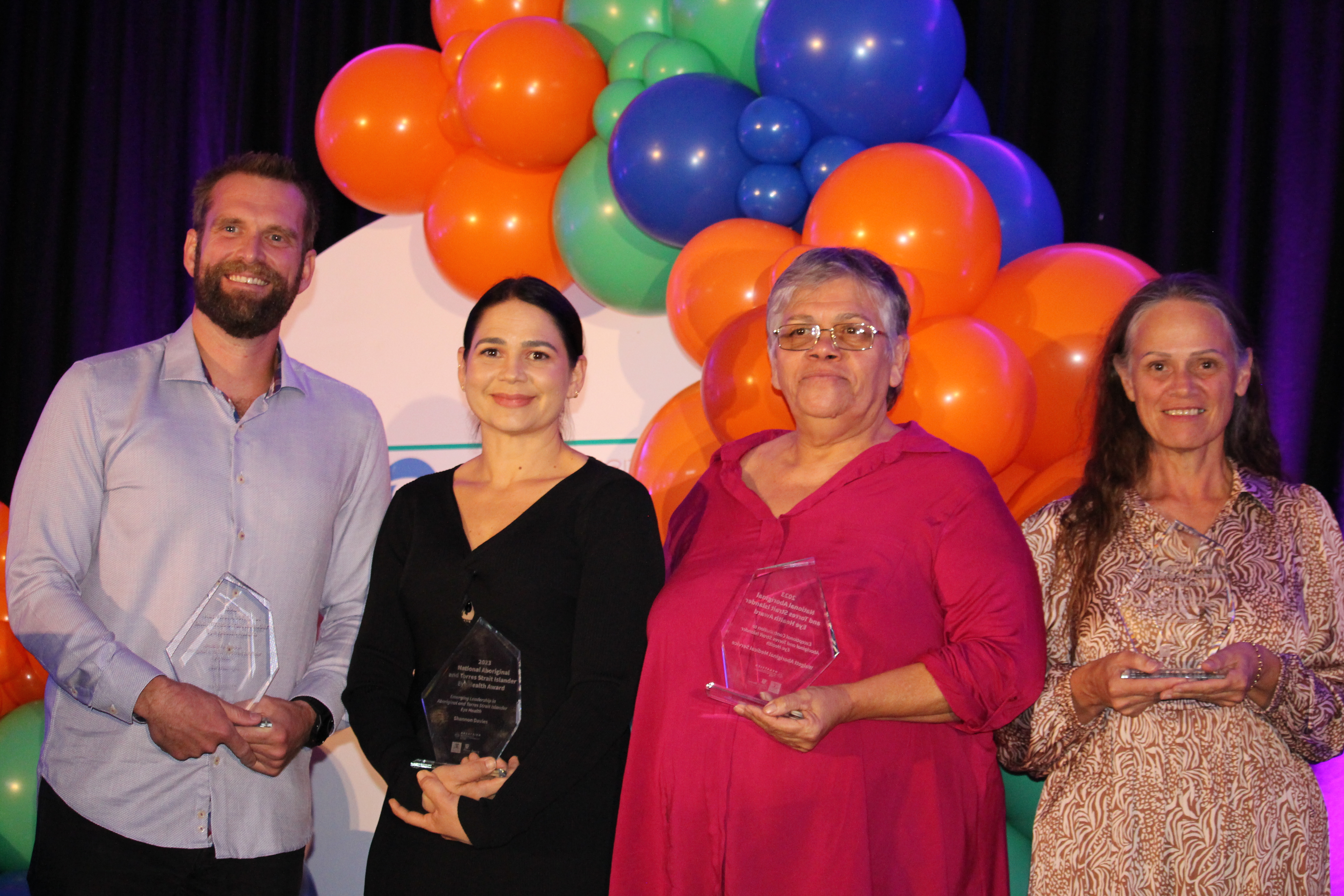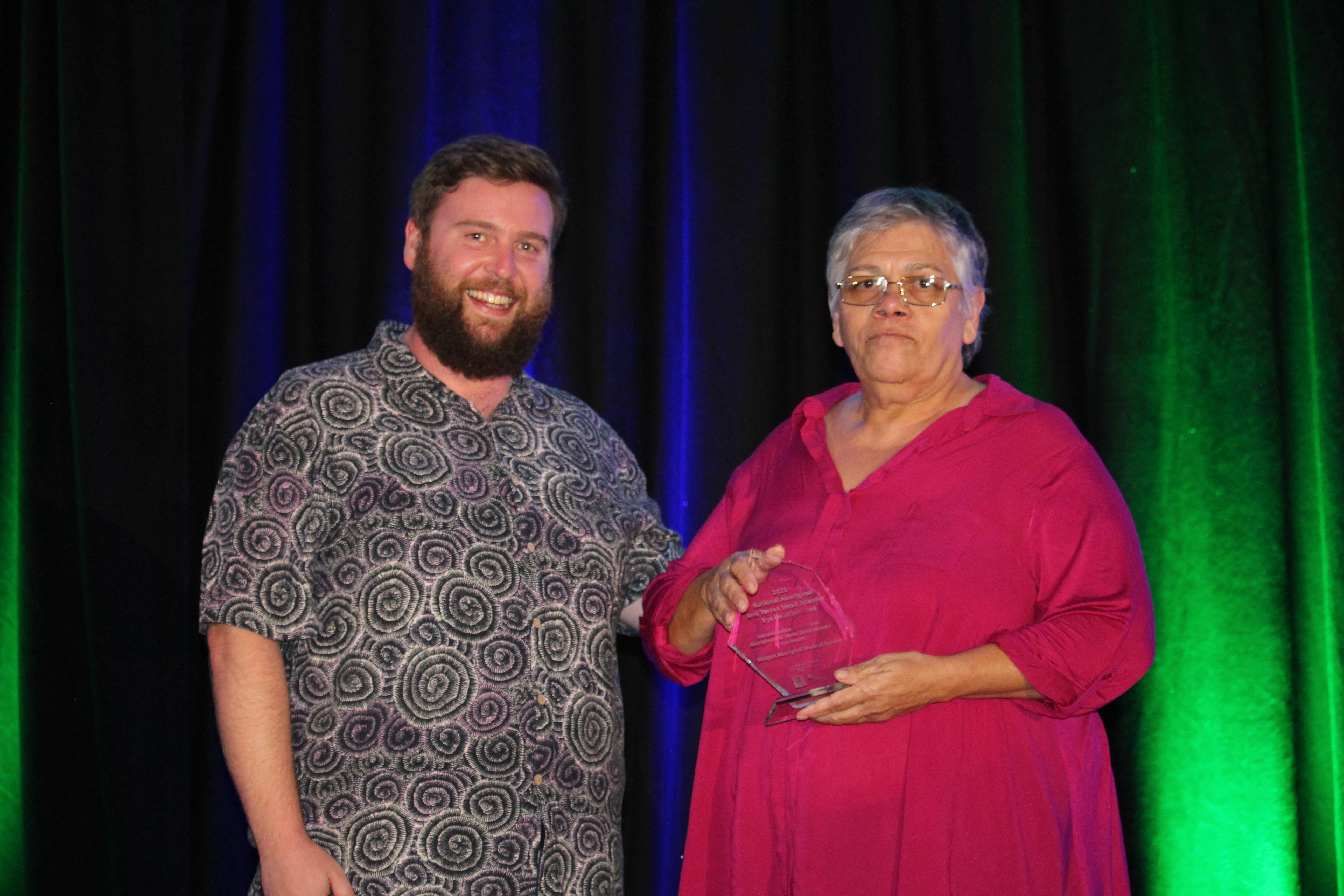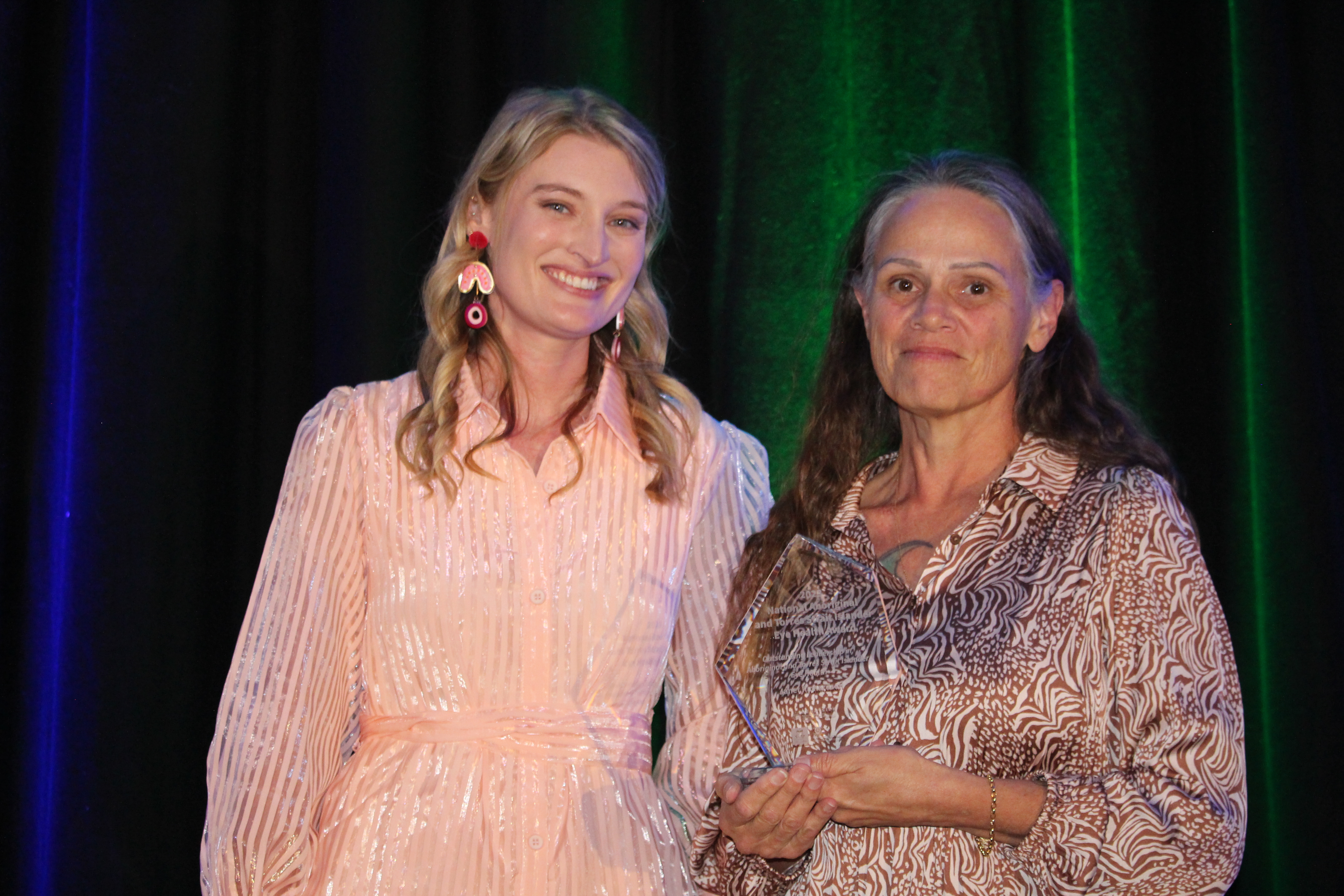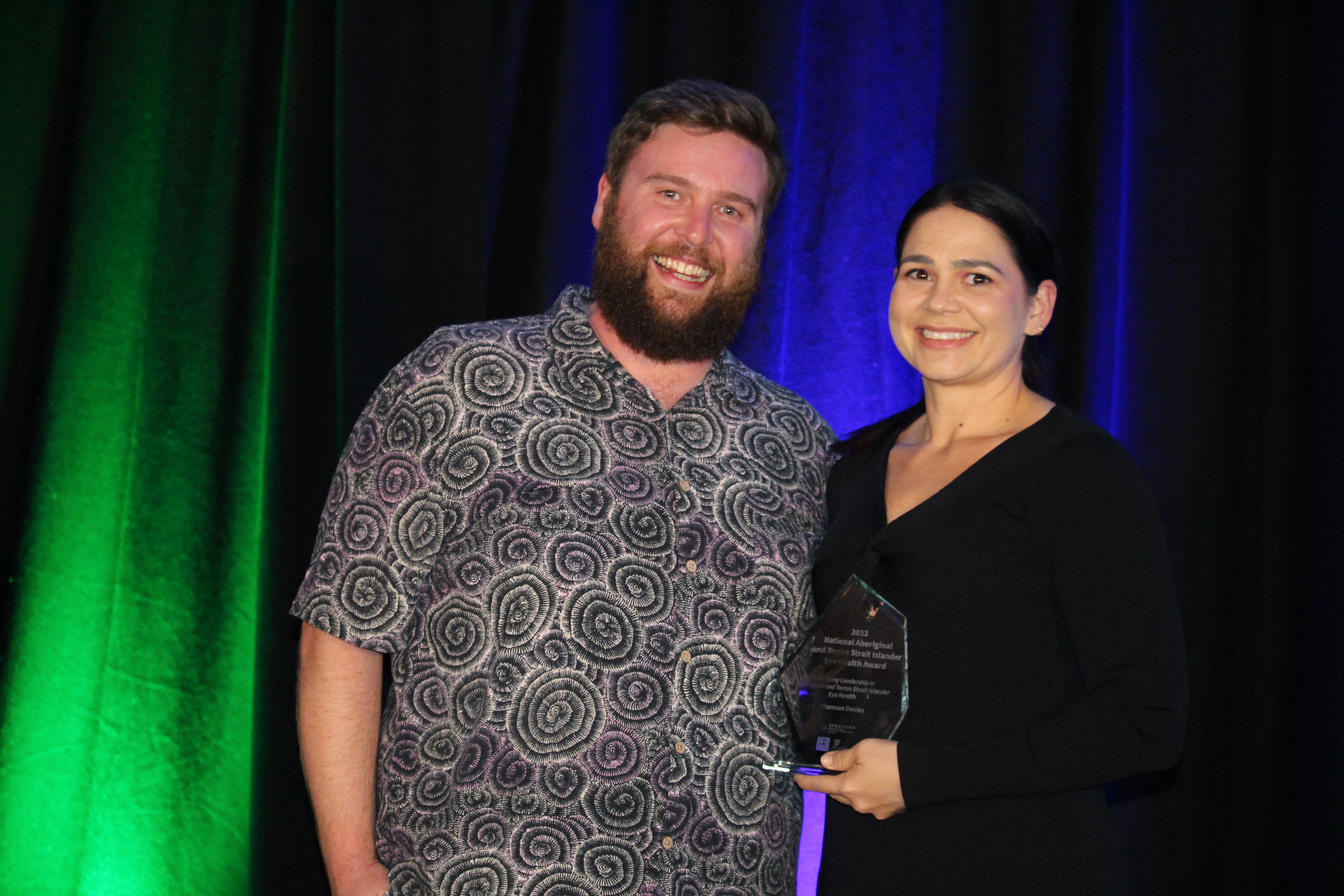Awards
The 2023 National Aboriginal and Torres Strait Islander Eye Health Awards:
The 2023 National Aboriginal and Torres Strait Islander Eye Health Awards were presented during the National Aboriginal and Torres Strait Islander Eye Health Conference 2023 on Dharug country, 24-26 May 2023.
Congratulations to the 2023 National Aboriginal and Torres Strait Islander Eye Health Award recipients:
Image: 2023 National Aboriginal and Torres Strait Islander Eye Health Award winners: Ben Hamlyn, Shannon Davies, Walgett AMS (accepted by Jenny Hunt) and Janet Richardson (accepted by Kerry Woods)
Exceptional Contribution to Aboriginal and Torres Strait Islander Eye Health Award by Aboriginal Community-Controlled Health Organisations (ACCHO): Walgett Aboriginal Medical Service
From the nomination statement: The Walgett Aboriginal Medical Service (WAMS) was one of the first eye health locations within an Aboriginal Community Controlled Health Service in NSW to provide bulk billed optometry services provided to their community members, starting in 1999 through NSW Aboriginal Vision program, co-designed with the Aboriginal Health and Medical Research Council of NSW (AH&MRC) and the Brien Holden Foundation (then known as ICEE). The fruit of those early seeds of collaboration continue to flourish today.
The nomination highlighted the dedication and commitment of WAMS management to eye health, as they have continued to fund a dedicated Eye Health Coordinator position since the very beginning of this program until today.
The WAMS Eye Health Coordinator supports clinics in Walgett and outreach services at Lightning Ridge, Goodooga, Collarenebri, Narrabri, Wee Waa and Pilliga.
Up until 2015 the WAMS Eye Health Coordinator serviced both the Walgett region and Hunter New England regions, supporting over 30 outreach clinics. WAMS worked with the support of optometry provider the Brien Holden Foundation to hand some of the Western NSW and Hunter New England clinics over to the established Aboriginal Community Controlled Health Services in those communities.
WAMS embraced eye health so much that they applied for infrastructure grants to establish a well-equipped dedicated eye health room. Local outreach patients are referred into WAMS when OCT imaging in required which eliminates travel for patients so eye health conditions can be managed locally.
Image: Nick Wilson with Jenny Hunt, who accepted the award for Walgett Aboriginal Medical Service (WAMS)
Outstanding Leadership in Aboriginal and Torres Strait Islander Eye Health Award: Janet Richardson
From the nomination statement: "Janet has been involved in eye health for many years. She is currently based in Broome working as an Aboriginal Health Worker. As a respected elder of Baard and Yawuru Ooranyg/Ngala Jandu (salt water woman), she has also been a community ambassador for the new Lions Outback Vision Kimberley Hub.
Janet’s journey with health care began when she was 15. She trained as a nurse and worked at the Broome Regional Aboriginal Medical Service (BRAMS) as technical assistant at Pathwest. In eye health, she has worked at the Fred Hollows Foundation and was based in the East Arnhem Region for 15 years as the Eye Health Coordinator and then worked for a period of time in WA Country Health Service (WACHS) as the Trachoma program coordinator. She is now back home in Broome and playing an important role in connecting her community to the eye care pathway. She says: “A healer has a special place in the community, is a promoter of health who will always regard persons who have taught them their craft, from this I have learnt and carried throughout my whole life the responsibility and honesty to maintain confidentiality entrusted to me for my job performance.”
Image: Lauren Hutchinson with Kerry Woods who accepted the award on behalf of Janet Richardson
Emerging Leadership in Aboriginal and Torres Strait Islander Eye Health Award: Shannon Davies
From the nomination statement: "Shannon is Australia’s first Indigenous woman to graduate in optometry. She grew up in Mareeba, a small town with a population of around 7,000 in Far North Queensland. She comes from the Wiradjuri People of Dubbo in New South Wales.
After completing her optometry degree at the University of Melbourne in 2004, she has become a pioneer for her people in the field of optometry, working in rural parts of Australia conducting school screenings and providing spectacles and eye care for Indigenous patients in remote clinics. Shannon owns a private optometry practice in Ayr Queensland. Shannon has been a member of the Optometry Australia Aboriginal Advisory Group. She is currently Deputy Chair of the Optometry Council of Australia and New Zealand Indigenous Strategy Taskforce and a member of the OCANZ Board.
Shannon’s pioneering work exemplifies this year’s theme of Our Vision in Our Hands: Finding our Voice and she is a leader in Aboriginal and Torres Strait Islander eye health.
Image: Nick WIlson with Shannon Davies
Deadly Allyship in Aboriginal and Torres Strait Islander Eye Health Award: Ben Hamlyn
From the nomination statements: Ben Hamlyn is an Adelaide based optometrist who has spent the last 10+ years working in remote communities to improve accessibility and quality of eyecare for first nations people living in the APY lands, Coober Pedy and Port Augusta. It is worth noting that Ben received no less than 4 separate nominations, a testament to the impact Ben continues to have on his colleagues.
Ben has made significant contributions to the health and well-being of the Anangu of the Pitajtjantjara Yankuntjatjara Lands South Australia, and throughout the regions where he works. Ben has conducted hundreds of eye checks, providing prescription glasses to people who would have otherwise struggled with daily living activities. Ben has also worked closely with the Aboriginal Community Controlled Health Services and their eye nurses and coordinators in developing community-based eye health programs that focus on prevention and early intervention, which are critical for reducing the incidence of eye disease among Indigenous communities. Ben has expanded Community Eyecare (the name under which he practices) from just himself a couple of years ago, to a team of 5 optometrists and growing, allowing for a significant increase in services given across the state. Ben not only still visits and sees these patients, but also coordinates the team and organises each clinic, corresponding with communities, funding bodies, and individuals to provide a seamless structure and an effective delivery of excellent service.
Ben’s commitment to Indigenous eye health is evident in all aspects of his work, from his clinical practice to his advocacy for the provision of funded prescription glasses and policy work in his role at Optometry Australia.
Image: Lauren Hutchinson with Ben Hamlyn
The 2023 National Aboriginal and Torres Strait Islander Eye Health Awards
Award Nominations
The 2023 National Aboriginal and Torres Strait Islander Eye Health Awards recognise achievements and contributions in Aboriginal and Torres Strait Islander eye health. These sector awards, formerly known as the Leaky Pipe Awards, have been handed out to champions and unsung heroes in Aboriginal and Torres Strait Islander eye care annually as part of the sector’s national conferences since 2018.
The awards are aligned with the Conference theme – Our Vision in Our Hands: Finding our Voice – set by the National Experts Group for Aboriginal and Torres Strait Islander Eye Health (NEGATSIEH), which contributes to the Conference Leadership Group.
This broad theme works to highlight and promote the importance of Aboriginal and Torres Strait Islander perspectives and leadership in the eye health sector locally and nationally. The theme also promotes the need for greater First Nations leadership through community-controlled services and evolving national governance mechanisms, including the call to enshrine an Indigenous voice into the Australian constitution.
We are pleased to open nominations for the 2023 awards, in the following categories:
- Contribution to Aboriginal and Torres Strait Islander eye health by Aboriginal Community-Controlled Health Organisations (ACCHO)
- Contribution to Aboriginal and Torres Strait Islander eye health (Individual)
- Aboriginal and Torres Strait Islander leadership in eye health
- Allyship in contribution to Aboriginal and Torres Strait Islander eye health
We are particularly interested in identifying and acknowledging the many ‘unsung heroes’ in Aboriginal and Torres Strait Islander eye health.
The 2023 National Aboriginal and Torres Strait Islander Eye Health Awards will be presented during the National Aboriginal and Torres Strait Islander Eye Health Conference 2023 on Dharug country, 24-26 May 2023.
See 2022 Award Winners Here:
-
Aboriginal and Torres Strait Islander leadership in eye health
Aboriginal Health Council of South Australia for the leadership of Michael Larkin and Chris Rektsinis in eye health in South Australia, with special allyship mention to Nicholas Schubert of Indigenous Eye Health Unit.
In 2021, AHCSA took on the responsibility of coordinating the quarterly run state Indigenous eye health committee – the SA Aboriginal Eye Health Working Group (SAAEHWG). The committee has been professionally run since then with working group sub committee planning sessions and with reference to state level data and the Roadmap to Close the Gap for Vision to guide the priorities and work that has occurred to date. The leadership provided by Michael Larkin in Chairing the committee and Chris Rektsinis in coordinating the group has been committed to service reform from the start. The underlying principle of this being an action based group that identifies high level gaps in policy, workforce, funding and resourcing has led the work of this group and is already creating real change to improve access to care for the Aboriginal and Torres Strait Islander community in South Australia. As we mentioned, there is also a special allyship mention to Nicholas Schubert of Indigenous Eye Health Unit. This is also to acknowledge that the award winners and Nick Schubert have actually nominated one another for an award. From the nomination statement, “Nick worked closely in partnership with AHCSA to establish the much needed South Australia Aboriginal Eye Health Working Group (SAAEHWG), whilst concurrently identifying and/or establishing several SA regional eye health collaborations. One advancement from these engagements has been the set-up of several fast-track cataract priority pathways for Aboriginal people in urban and rural areas, and reinforcing the relationships between primary, secondary and tertiary services.
-
Allyship in contribution to Aboriginal and Torres Strait Islander eye health
Will Chin
Will has been nominated “for his efforts to help improve access to eye care for Aboriginal and Torres Strait Islander people in my community. His efforts go over and above personally delivering eye care and include the donation of equipment, training and upskilling AHWs/AHPs, providing mentoring, and advocating strongly for the redistribution of eye health funding to Aboriginal organisations”. Will’s generosity and commitment to improving Aboriginal and Torres Strait Islander eye health also extends to building capacity and capability in the ACCHOs he visits by donating/ upgrading equipment, expanding services and responding to the aspirations of the ACCHOs and the communities they represent. He expects nothing in return and is content with seeing individuals and Aboriginal Organisations succeed in delivering eye care to their communities. And as a true ally, Will would also prefer to remain in the background and instead often assigns credit appropriately, and even uses his position/power to amplify our voice to fundholders. These are the actions of a true ally and an unsung hero.
-
Special allyship award for contribution to the Aboriginal and Torres Strait Islander eye health sector
Mitchell Anjou
Mitchell lives and breathes the values of the 2022 Conference theme, ‘Our Vision in Our Hands’, genuinely seeking allyship, and to promote and advance First Nations leadership and ownership over the eye health sectors’ work and vision throughout his many spheres of influence. These span his work progressing regional implementation of the Roadmap to Close the Gap for Vision (2012) at the University of Melbourne, his commitments across the optometry sector through Optometry Australia, Optometry Victoria/South Australia and the Optometry Council of Australia and New Zealand (OCANZ), and his engagement with the broader eye health and vision care sector via Vision 2020 Australia. Across his contributions to the optometry sector in particular, notably as Chair of the Optometry Australia Aboriginal and Torres Strait Islander eye health Advisory Group, and co-Chair of the OCANZ Indigenous Strategy Taskforce, Mitchell has consistently sought to engage and empower First Nations people, through mentorship; the active creation of opportunities which seek to build capacity; and holding space for transfer of power and leadership roles as suitable. Further his personal commitment to ensuring that the optometry profession in particular takes strong steps towards reconciliation in all spheres has established and continues to strengthen progress among leading organisations in the sector.
-
Contribution to Aboriginal and Torres Strait Islander eye health (Individual)
Lauren Hutchinson
Lauren is a valued graduate member of IAHA who is extremely generous with her time and knowledge, supporting positive health and wellbeing outcomes for Aboriginal and Torres Strait Islander people and rural Australians. Lauren has contributed significantly to the work of IAHA, including through her representation on committees, such as the Vision 2020/NACCHO Roundtable on Eye Health and Vision Care, and through her input on national health policy consultations. Lauren’s expertise in Aboriginal and Torres Strait Islander eye health and her personal and professional experience working in a rural setting, allows IAHA to develop and inform policy to achieve true equity in health care. As a student Lauren sat on the IAHA Student Representative committee playing an important role in building and promoting allied health workforce development and contributing to IAHA’s vision that all Aboriginal and Torres Strait Islander people, including future generations, are healthy, strong, thriving and self-determined. Lauren is passionate about contributing to her local community. She believes in quality health care in rural areas. This is evidenced by her returning to her home town after uni and started work as an optometrist in Forbes. She has started a school screening program in her local area after noticing that the local Aboriginal kids weren't accessing the eye testing service. Lauren goes above and beyond to work with and for her community, including as a role model to future Aboriginal and Torres Strait Islander optometrists.
-
Contribution to Aboriginal and Torres Strait Islander eye health by Aboriginal Community-Controlled Health Organisations (ACCHO)
Orange Aboriginal Medical Service
Orange Aboriginal Medical Service have been working, with support from Rural Doctors Network and AH&MRC, on systems to better integrate eye care in clinical practice. Their services include a retinal screening integrated in every Aboriginal Health Check or Diabetes check to assess the health of the retina and to detect and manage eye conditions and disease. Visual acuity is also measured in every health check and patients are referred accordingly. Optometry services are provided by optometrist Lauren Hutchinson working with the Brien Holden Foundation, and Orange are reporting that optometry clinics are always fully booked with clients of all ages. After years of working with the Western NSW Eye Health Partnership Project, including with Jane Hager (another past award winner!), a bulk-billed pathway into ophthalmology treatment has been established for Orange AMS patients. The NSW Eye Health Partnership Project allows Orange AMS to have ongoing contact with service providers and other ACCHOs in the region to best support the regional eye care pathway.
Selection criteria
Selection criteria for the awards include a significant contribution and demonstrable outcomes to improve eye health for Aboriginal and Torres Strait Islander Australians.
Achievements will be measured against a broad range of criteria and can include making a difference in eye health within a clinic, community or region, participation and support for eye care improvements, supporting implementation of the Roadmap to Close the Gap for Vision and Strong Eyes, Strong Communities and contributions to other programs and initiatives within the Aboriginal and Torres Strait Islander eye health sector.
The Conference theme, Our Vision in Our Hands: finding our voice, will also be reflected in the selection process.
The selection committee for the 2023 awards is comprised from members of the Aboriginal and Torres Strait Islander Conference Leadership Group.
Nominations
The nomination requires
Nomination form, which includes:
- a 300-word maximum statement in support the individual, group or organisation that is being nominated
- name and contact details of a supporting referee
- name and contact details of the person making the nomination
- Please use the nominations form (below).
Nominations Close, COB 21/4/2023
For questions, additional information, or support with your nomination, please contact us at Indigenous-EyeHealth@unimelb.edu.au




